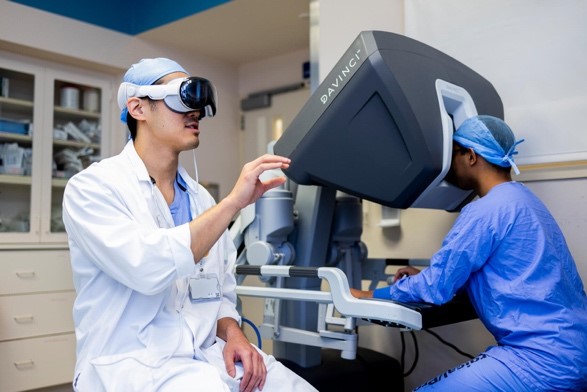apoQlar Medical enters Collaboration with Mayo Clinic for Robotic Surgery Education in Extended Reality

apoQlar Medical, a pioneer in medical extended reality (XR) technology, has announced a collaboration with Mayo Clinic for the co-creation of an XR application designed to assist robotic education for the clinical workforce. This joint effort seeks to combine apoQlar Medical’s technological expertise with Mayo Clinic’s clinical know-how.
Mayo Clinic, in addition to bringing clinical acumen to the project, also aims to further develop the robotic education use-case by directly testing the technology in-house. Cornelius Thiels, D.O., of Mayo Clinic shared his enthusiasm for the project stating, “Robotic surgery is a fundamental component of surgical care at many hospitals around the world, and together we have developed strategies to support robotic education and intra-operative robotic assistance.”
This XR technology aims to allow medical students, residents, nurses, physician assistants, and surgical assistants to engage in an immersive 3D operation in a way that mirrors the experience of a surgeon. Sirko Pelzl, CEO of apoQlar, shared his excitement, “We see the fast adoption of robotic surgery around the world. But with any new technology there is always a need to innovate on training and education and this is where we think we can bring something great.”
The use of immersive tools in healthcare seeks to enhance surgical planning, improve interdisciplinary team collaboration, and provide better patient education opportunities. This initiative builds upon a prior agreement already established between the two organizations, with an earlier project focused on using XR for personalized treatment planning.
The partnership stands as a testament to how immersive technologies are transforming healthcare education and clinical practice, particularly in specialized areas such as robotic-assisted procedures. Extended reality—encompassing AR, VR, and MR—offers a depth of visualization and engagement that surpasses traditional methods. Through simulated environments, learners gain valuable, realistic experience long before entering an actual operating room.
A central objective of this joint initiative is to close the gap between theoretical instruction and hands-on medical practice. The flexibility of immersive platforms offers medical professionals the chance to train on-demand, an essential advantage in a healthcare environment where continuous skill development is crucial.
Additionally, this effort aligns with broader trends in healthcare that aim to reduce the steep learning curve of robotic-assisted surgeries. These operations often demand precision and skills distinct from conventional procedures. XR makes it possible to rehearse these workflows in a highly interactive and risk-free setting, enabling users to build confidence and familiarity with both tools and techniques.
There is also significant potential for reducing training expenses. Traditional methods often require costly physical simulators or in-person courses with limited accessibility. Digital platforms, however, offer scalable and accessible solutions, opening doors to institutions around the world and democratizing high-quality surgical education.
Another notable aspect of the project is its emphasis on clinician-driven feedback. Having medical professionals at Mayo Clinic directly interact with the XR application ensures that development is shaped by real-world insights. This feedback loop supports the creation of a tool that is not only innovative but also intuitive, effective, and grounded in daily medical practice.
Looking ahead, the scope of this initiative may expand well beyond surgical training. The tools, methodologies, and frameworks being developed could potentially be adapted for disciplines such as cardiology, emergency response, or orthopedics—bringing immersive education into more areas of medicine.
Ultimately, this collaboration with Mayo Clinic reflects the evolving synergy between clinical expertise and technological innovation. As the healthcare industry continues its digital transformation, partnerships like this play a vital role in ensuring that modern tools serve practical, patient-centered outcomes and redefine the future of medical training.
For further details about this collaboration please visit the link: https://apoqlar.com
apoQlar Medical stands at the forefront of XR solutions that simplify complex medical data into accessible visual formats for the purposes of surgical planning and clinical education.
Note: Mayo Clinic has a financial interest in the technology mentioned in this release. Any revenue received by Mayo Clinic will be allocated towards supporting its non-profit mission in patient care, education, and research.